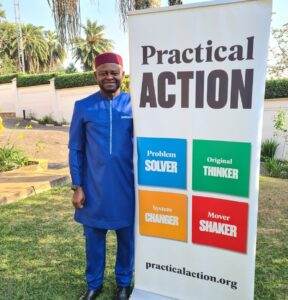
The United Nations Resident Coordinator in Rwanda, His Excellency Dr Ozonnia Ojielo paid a visit to Practical Action’s office in Kigali.
Dr Ozonnia was warmly received by the organisation’s global leadership team, including CEO Sarah Roberts, as well as the Rwanda office team, communications and business development staff from our international and Africa country offices.
Dr Ozonnia delivered an inspiring speech that touched upon his career trajectory working on peace, security, and development issues and how service to humanity fuelled his passion for what he does today in his role as the UN Resident Coordinator in supporting sustainable development in Rwanda, and the UN’s future vision.
This was followed by a thought-provoking discussion which was moderated by Practical Action’s Africa Director Akinyi Walender, fostering exchange of ideas and insights.
Highlights
Dr Ozonnia emphasised several key points during his address:
He discussed the global challenges to development. Many member states are struggling to realise the Sustainable Development Goals (SDGs) a lot of gains that had been made have seen serious reversals because of the impacts of climate change and Covid 19, which many countries are still grappling with and some of the greatest reversals have been felt on women’s rights, peace, and governance.
He underlined that the UN’s role in a country is to support the government in meeting their obligations on economic transformation and the SDGs. The tools available to the UN agencies are the common country analysis, cross border and regional analysis, the cooperation document, and the governments national development strategies, because context is especially important in development.
He spoke about the importance of building partnerships, co-creation, collaboration, and ambitious initiatives that bring scale, emphasising that our work must bring about social, economic transformation in society, communities, and countries.
He called for development actors to align their actions with national development strategies and the importance of informed decision-making through reliable data, high-quality advice, and analysis.
Dr Ozonnia called upon organisations like Practical Action to collaborate as equal partners with the UN, fostering mutual learning, creating a shared vision, delivering on objectives, and advocating on crucial issues and solutions within the UN and across countries.
He challenged organisations that work in Africa saying, ‘many organisations are in the business of managing poverty’ organisations must ask themselves ‘what is our footprint?’ is our work transformational? If it is not, then the organisations must think long and hard about what they are doing. Many claim to make impact within a very short time; however, what they achieve is evidence of progress. Impact comes later, and in the advent of climate shocks, impact may not even be realised because shocks often reverse progress.
He spoke about financing models which have forged a pathway from funding to financing for sustainability, the big issues today being around access to energy, agriculture and food systems; the weakness with the current climate financing and need for African countries to continue strong advocacy for adaptations funds. He spoke about the potential of pension funds to stimulate entrepreneurship in economies by serving as guarantees for loans and investment schemes for individuals with innovative ideas but limited capital.
Leadership
Dr Ozonnia’s experience and perspective on leadership was particularly refreshing. He argued that leadership is measured by the quality of ones mentoring and coaching. As Africa is a continent with a large population of young people, nurturing leadership is imperative. Dr Ozonnia has mentored many women and men who now hold leadership positions on the continent, and he is not done yet because there is a lot of talent and capabilities all around us.
He said, ‘We are only limited by the degree of our ambition’ and encouraged Practical Action’s leaders to nurture our teams, to be relational and NOT directional, build confidence, delegate, and trust teams to deliver.
Reflecting on the session with Dr Ozonnia, Akinyi Walender, Practical Action’s Africa Director, said:
“We have been sufficiently challenged, especially on how we nurture leadership. We appreciate Dr Ozonnia’s valuable inputs. His perspectives shed light on the evolving nature of the UN and provided us with much to contemplate regarding Practical Action’s operational strategies in the years ahead. As both the UN and the development sector undergo rapid transformations, we find that his remarks align closely with Practical Action’s working model, emphasising the power of small-scale initiatives to drive meaningful change. Like him, we believe in fostering innovation, collaborating closely with partners to plan, implement, and deliver impactful solutions.”